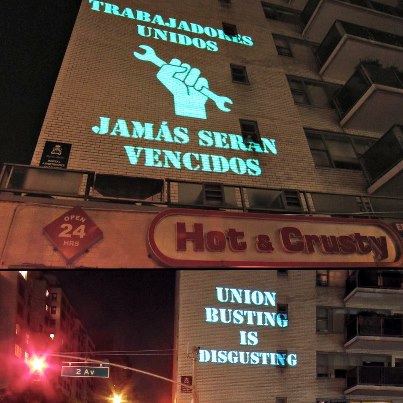“We are the 99%”…“They got bailed out, we got sold out”… I’m looking forward to belting out these chants with thousands of others this weekend to celebrate the one-year anniversary of Occupy Wall Street. We all know the story by now, on September 17th, 2011 two thousand people marched on Wall Street in New York City, eventually inspiring a few hundred cities across the U.S. and around the world to set up their own encampments calling for an end to corporate greed and for a system that puts people before profits. No matter what your feelings are about “Occupy” or the “Decolonize” movement, no one can deny that it has transformed our progressive movements. It has galvanized formally “disengaged” people to become actively engaged in their communities and influenced the national debate on critical issues like jobs, healthcare, housing, education, immigration and militarism, just to name a few.
As a media artist myself, I often struggle with the role artists and cultural workers should and need to play in social justice movement building. Many of us navigate through these movement spaces, wearing multiple hats – as artists, as organizers, activists, teachers, academics, writers – but we bring our “whole selves” and experiences to advance this work forward. Last year, the Media Action Grassroots Network (MAG-Net) hosted a digital dialogue featuring artists and cultural workers like Jasiri X, Melanie Cervantes, and Michael Premo who used their music, art and films to advance the Occupy stories, message and issues
Last weekend, I was once again reminded of the power of arts and culture in telling the stories of the 99%. I had the privilege of moderating the “Prodding the Sleeping Giants: Media, Art & Citizen’s Movements” panel at the National Alliance of Media Arts and Culture “Leading Creatively” conference in Minneapolis. Panelists like MAG-Net members Bryan Mercer of Media Mobilizing Project and Erick Boustead of Line Break Media, spoke to the power of storytelling and specifically the importance of working along side communities- who have been directly affected by injustice and oppression- to shape their own stories. Our panel focused on how folks were creating their own media and distributing them to amplify marginalized voices. Inez Gonzlez of National Hispanic Media Coalition, reminded us about the need to fight corporate media and hate speech.
The discussion during the Q &A was so rich and honest, and we all wish we had a few extra hours to continue the candid interaction. A young African-American man in the audience talked about communities of color and the lack of access to the Internet despite the need to get these messages to those that need to hear it the most. A Native-American woman spoke about the need for self-determination and for “us” to be able to own our own stories, and she raised questions about what it truly means for white mediamakers and activists to be allies to the struggles in communities of color. Finally the panel was capped off by Joe Torres, co-author of “News for All the People”, Free Press staffer, and Center for Media Justice board member. He reminded us that oppressed communities have been creating our own media and telling our own stories for centuries, such as the “The North Star” founded by Frederick Douglass one of the first abolitionist newspapers.
The issues raised around being able to tell our own stories, document our struggles, and push back against the corporate status quo continue to pop up as we see unions ramping up the fight for workers across the country. This week I, like many, have been incredibly inspired by the Chicago Teachers Union and their fight for a fair contract and a stellar education for Chicago’s public school youth. The song “Chicago Teacher” produced by hip-hop artist and activist Rebel Diaz, pays homage to public school teachers and has been occupying the Internet.
 In addition, Occupy Wall Street activists have collaborated with the workers of Hot and Crusty Bakery for several months demanding fair working conditions and the right to form a Union. The Illuminator, a cargo van equipped with video and audio projection, brings the spirit of Occupy Wall Street to streets. Two weeks ago, they projected an image across the street from the bakery of a fist holding a wrench that read “Trabajadores Unidos, Jamas Seran Vencidos: Union Busting is Disgusting”
In addition, Occupy Wall Street activists have collaborated with the workers of Hot and Crusty Bakery for several months demanding fair working conditions and the right to form a Union. The Illuminator, a cargo van equipped with video and audio projection, brings the spirit of Occupy Wall Street to streets. Two weeks ago, they projected an image across the street from the bakery of a fist holding a wrench that read “Trabajadores Unidos, Jamas Seran Vencidos: Union Busting is Disgusting”
Last September sparked a movement that has been resilient and wide-spread in its influence. In celebration, the Media Action Grassroots Network (MAG-Net) is hosting a special call highlighting filmmakers and mediamakers who have been using their films as catalysts for social justice, organizing and advocacy. From tackling the prison industrial complex and repercussions for families, to fighting foreclosures, to protecting immigrant and labor rights, mediamakers have been using their media to advance these important issues and effect change in the national agenda. As moderator, I would like to invite you to join us in what promises to be a dynamic and inspiring digital dialogue.



